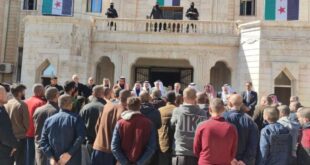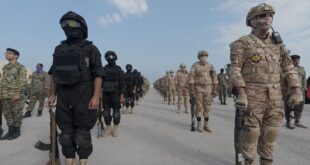SOHR sources from inside eastern Ghouta say that members of the branch “277”, known as “Military Security”, have seized hundreds of apartments, shops and farms again in several areas in eastern Ghouta, under the decision of “provisional seizure.”
According to Syrian Observatory sources, members of the “Military Security” have seized more than 40 houses and shops in the city of Saqba in the neighbourhoods of Al-Jawza and near the al-Jamiya roundabout, al-Ma’asra and Saqba Al-Balad area of the country. They also seized more than 100 houses, farms and shops in Douma city, particularly in al-Jala street, the Sports City perimeter, the medical tower, Al-Hajjariyeh and al-Quwatli street and the farms of Al-Abb. They also seized some 150 houses and shops in several cities and towns, including the town of Zamalka, which witnessed a chemical weapons massacre of civilians in 2013.
The seizures were concentrated near the mosques of Al-Tawba and Abu Bakr al-Siddiq, and in the city of Arbin near the area of Al-Mahatta and other neighbourhoods in the city. The town of Jisrin on the main street and near the complex of Al-Shimi Land and the road 14. Harasta in the neighbourhoods of Al-Bustan, Ajami, Sil and Bastara. The town of Ain Tarma near the old mosque and the residential complex of Al-Qusur and residential complexes adjacent to the Al-Khayr markets, and the area of Kafr Batna in the area of al-Karm, municipal square, neighbourhoods of Al-Tahun and Sheikh Ibrahim, and the city of Al-Malaiha in the area of reserve bakeries and the area of the Al-Kabir mosque.
All of these confiscated properties belong to opposition civilians either in northern Syria or outside the country in Arab and European countries, or a few of them are still in eastern Ghouta.
Some of these confiscated properties are inhabited by the owners’ relatives, while the members of the “Military Security” patrols gave them a notice period of not more than 20 days to evacuate these properties, after the patrol members entered and checked all these properties and registered their belongings using paper records in order to prevent the owners’ relatives of the confiscated properties from disposing of their properties or selling them.
Civil sources have told the Syrian Observatory that officers from the Syrian coast, were settled with their families in some houses of which a “provisional seizure” order has been issued against them in the town of Ain Tarma, the district of Kafr Batna and the city of Al-Maliha. This has triggered a state of fear and panic among the local population in eastern Ghouta, accusing the regime of following the policy of “demographic change” in the area.
This coincides with the continued purchase of real estate in the cities and towns of eastern Ghouta by a group of people affiliated with the local militia “Al-Abbas Brigade”. The most prominent of these traders is a person named “Abu Yasser al-Bakary”, a member of the Al-Bakara clan, as he purchased many properties before in Deir ez-Zor, at the orders of the militia leader “Adnan Al-Abbas.”
On December 11, reliable sources informed SOHR that forces of the “277” branch known as “Military Security” affiliated with the regime forces have seized, over the las week. a large number of houses in the areas of Saqba, Kafr Batna, Hamouria, Beit Sawa, Jisrin, Ain Tarma and Zamalka in the eastern Ghouta of Damascus.
In details obtained by the Syrian Observatory from local sources inside eastern Ghouta, patrols of the “Military Security” branch, accompanied by personnel of the regime’s government departments, went to more than 100 houses in those areas in eastern Ghouta, and marked the doors of the houses with paint and wrote “Seized by branch 277”, then they spoke with the residents of these houses to evacuate them in a maximum of one week.
According to Syrian Observatory sources, all the houses that have been or are being seized, owned by persons whose property was confiscated under the decision of “provisional seizure of property”, which belong to people who have been displaced to the north or live aboard in the countries of asylum, and some of them are in the regime prisons.
On November 20, reliable SOHR sources in eastern Ghouta recently reported increasing number of real estate purchases in the towns and cities of Ghouta by a group of people working for dealers from Deir Ezzor. These people buy real estates, mostly houses and some shops, at the orders of the dealers. However, the fact that all these real estates are kept closed after being sold has was seen as worrisome.
According to SOHR sources, these dealers are from Al-Mayadeen countryside in eastern Deir Ezzor and affiliated to the Iranian-backed local militias of “Al-Abbas Brigade”. The most prominent dealer is a man from Al-Bakarah tribe called Abu Yasser Al-Bakary, who has bought many properties in Deir Ezzor at the direct orders of Adnan Al-Abbas, the leader of “Al-Abbas Brigade”.
Such purchases are concentrated in eastern Ghouta, particularly in Kafr Batna, Hazza, Saqba, Ain Tarma, Al-Mulayha and Zamalka. These deals included real estates which have been for sale and other properties whose owners have been displaced to northern Syria or travelled overseas, via brokers of both sides.
It is worth noting that the number of real estates purchased by “Al-Abbas Brigade” in the past few months exceeded 300, while the value of each real estate sold during this period ranged between 25 million SYL and 125 million SYL, according to the size and location of the real estate.
SOHR sources have confirmed that these processes are on the march, as representatives of these dealers, carrying individual guns, pay periodical visits to real estate offices in eastern Ghouta where they ask about properties available for sale, and ask these offices’ owners to inform them as soon as new properties become available on the market.
Such suspicious and uncertain developments in the area have triggered the residents’ fear and worry over the purposes and reasons behind the purchase of a large number of real estates in their cities and towns.
 Eurasia Press & News
Eurasia Press & News



